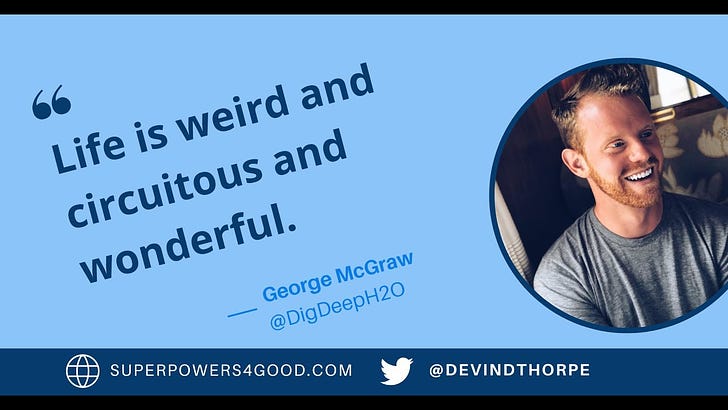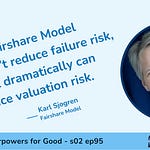Devin: What is your superpower?
George: Ever since I found out that you were having me on, which I was really excited about, I’ve been thinking about this question. I’m a young queer man who grew up in a pretty conservative, pretty religious household. I think my superpower is my ability to really see someone and intuit what they need from me. I mean that on an emotional level, a level of service provision. I also think there’s a level of like drive, drive for achievement that comes with that. I see people, and I see what they need, and I’m driven to achieve that thing for them and for myself.
DigDeep didn’t start its work in the United States. Founder and CEO George McGraw shares the story of a $50 donor who changed its focus with a single phone call:
Well, this story is a little embarrassing, but I had no idea that this was a problem in my own country. I think I've always had a passion for water and studied international human rights law, and wanted to work on this issue abroad. I mean, I truly thought if you wanted to make a difference in water, you had to work abroad.
So, like many good millennials, I got on a plane and went over to help. Our first focus at Dig Deep was on water access projects in Cameroon and in South Sudan—great work that was focused on the human rights aspect of this kind of slow development, community-led, very participatory approaches that were really successful over time.
And then one day I got a call on our office number from a donor named Karen. I kid you not. She said, “I want to give you 50 bucks, but my only requirement is that you spend it on the Navajo Nation.”
I was like, “Karen, people in the US don't need your money. We have water. Why don't you let me spend it where it's really needed?”
And there was some silence on the phone, and you could tell she was kind of like controlling her temper a little bit.
But she explained to me that she had been working on Navajo on a Habitat for Humanity-style project, building houses, and her Navajo colleagues explained to her that like, we don't put kitchens or bathrooms in these houses that we're building because there's no running water here.
She was so floored, as I was, to find that that was happening in her own country. That's how we really got started on the Navajo Water Project.
Eventually, George would learn that 2.2 million people lack taps or toilets in their homes right here in the United States. That doesn’t count the folks in Flint, Michigan or Jackson, Mississippi, where there is water, but that’s not safe to drink.
Without running water in the home, residents must shower with family or friends or at fee-for-use places like truck stops. Of course, it also means buying bottled water—if they can afford it—or spending hours daily retrieving water from a stream or trough.
One of the most extreme examples is on the Navajo Nation. “Almost a third of families don’t have running water at home,” George says.
Indigenous people lead DigDeep’s Navajo Water Project.
The COVID pandemic made a long-critical problem into a full-blown crisis. Without running water, two fundamental strategies for preventing the spread of the virus were challenging. You can’t wash your hands or stay home if you don’t have water there.
DigDeep’s model is to install a tank to hold water underground and a sink and shower inside the home. The people doing the work are Navajo. “All of a sudden, that was scary, unsafe, dangerous.”
Initially, DigDeep shifted to emergency water distribution, serving the needs of at least 30,000 families.
Then one of the team members had some inspiration. George shared the story:
One of our staff members on Navajo, he got in a fight with his wife. All of us in relationships understand. She was like, “Go out to go out to our Hogan, go out to our other house and stay there for the night.”
So, he packed his clothes and some water bottles in the suitcase and he went out there to spend the night. He woke up in the morning and realized, “Oh, no, I left my water in the car. Now, I'm going to get it out and it's going to be frozen.”
But when he opened up his suitcase, it had been insulated by all his clothes. Even though it was subzero temperatures overnight, it hadn't frozen. So, that's where the idea for the suitcase came in. And he went on and became a finalist for the Innovation by Design Award from Fast Company for it.
Building on this idea, DigDeep put its system largely inside an insulated box the size of a suitcase. The system includes a pump, a filter and a spout. The staff installs the solar-powered system without entering the home, making the process safer for the team and those who get the new water system.
DigDeep plans to return to the homes to move the systems inside once there is an all-clear sign from public health authorities.
George says DigDeep is growing. “Now we have the Appalachia Water Project, which serves folks in rural West Virginia and Eastern Kentucky. And we have the Colonias Water Project, which serves people in these irregular communities along the US-Mexico border called colonias.”
For building DigDeep, George has leveraged skills he developed as a child, reading people to understand their needs and pairing that with a desire to serve and care for them. Could we call that empathetic passion for service?
How to Develop Empathetic Passion for Service As a Superpower
“I see people, and I see what they need, and I’m driven to achieve that thing for them and for myself,” George says of his superpower.
Though it conjures difficult memories, he’s grateful for the abilities he developed in his youth. He shared the story.
I think for me, growing up as a queer kid in the closet, I got really good from a place of fear at analyzing other people's emotions and needs and sort of interior lives to try to understand, like, “How are they perceiving me? Is my sort of ruse working? And am I safe?” Kind of like a tool of manipulation, right?
It combined so often for me with this other phenomenon that a lot of queer people will talk about; we call it "best little boy in the world syndrome.”
We start from this place where we feel this deficit, that there's something wrong with us. So, we have this drive to achieve and to produce and to produce and to prove that we are worthy and that we are good, and that even if you guess our secret and don't like that thing about us, you'll still find something of value there.
In like the unevolved beginning of my life, those were some of my biggest struggles and honestly, were often weaponized against me and against other people as manipulation, as fear, as hiding, as lying.
But now I think if you can heal those and kind of use the momentum of them and redirect them toward good, there's a lot of beauty and a lot of utility there. I'm really glad for them.
George acknowledges that others had it worse. “First of all, I feel like I should say that as sort of like a cis white man, I had it pretty easy.”
“I have trans friends of color, and in other folks in the community who don’t have that luxury and had to be a lot braver and muster a lot more power a lot earlier and were horribly abused by society and sometimes by their families or friends as a result,” he says.
He points to a personal experience as evidence that times are better today for kids coming out now. “I was in a relationship for a long time with someone who has a teenage son. And I remember early on that boy had come to him and said, like, papa, when I kiss someone, is it okay if I kiss girls?”
Meditation and mindfulness may unlock some of the ability to develop an empathetic passion for service, George says. “I spent a lot of time in my formative years essentially meditating, essentially practicing mindfulness.”
“I see a lot of similarities between those two things, between that active pursuit of mindfulness now as an adult and what I was experiencing as a young person who was struggling so much internally and who spent a lot of time focused inward,” he says. “I think that helped develop that muscle.”
Still, he says, that won’t likely get you all the way. “I have yet to meet a person whose true superpower wasn’t developed almost accidentally.”
He offers a hypothetical example to make his point, “I had a conversation at a bar one night that led to another conversation somewhere else. And, you know, now I’m a roller coaster designer living in Tustin, Florida.”
Developing a superpower results from countless influences, including those determined by genes.
“Life is weird and circuitous and wonderful,” George says.
By following his example and advice, you may find that life’s wonder helps you develop a superpower like an empathetic passion for service.
















Share this post